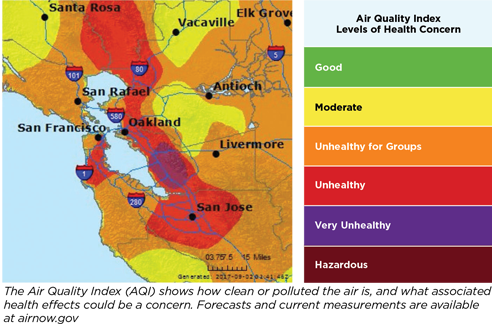April 29 – May 3 is Air Quality Awareness Week, sponsored by the NOAA National Weather Service, the Centers for Disease Control and Prevention (CDC), the U.S. Forest Service, and the United States Environmental Protection Agency (EPA). This year’s theme is “Check the AQI & Get Outside” to encourage everyone to check the Air Quality Index (AQI) regularly. Today’s focus is “The Air Quality Index and Sensors.”
It should come as no surprise that the quality of the air we breathe affects our lungs. According to several studies, air pollution can make asthma symptoms worse. It’s also linked to higher asthma-related emergency room visits among senior adults and higher asthma rates in children.
Air pollution comes from both man-made and natural sources, such as:
- Traffic
- Ozone
- Gases
- Smoke
- Dust
- Pollen
They can all pollute the air and irritate people’s airways.
The air quality can be better or worse depending on many factors. Some of these are hot temperatures, humidity, industrial output and high traffic. Air quality can change daily. So it’s important for people with asthma to check the air quality index (AQI) in their area often.
The EPA reports air pollution levels using the AQI on AirNow.gov. AQI reports the level of ozone and particle pollutants. The AirNow site uses a color chart to help you know what zone the air quality is in.

Tracking the Air Quality Index
If you have asthma, your symptoms can get worse even when ozone levels are moderate (AQI 51-100). When the AQI is 101 or higher, it is dangerous for people with asthma. You may have to change your activities and medicines.
In the United States, we have Action Days when air pollution is high. Orange days, and yellow days that will likely move into the orange zone, are declared Action Days. On Action Days, people with asthma should limit their time outdoors, especially from 11 am to 8 pm. Stay in a well-ventilated, preferably air-conditioned, building. Don’t exercise outside on Action Days.
You can follow your local air quality on AirNow.gov and on the EPA AirNow app.
Using a Portable Air Quality Sensor
Portable and home air quality sensors are becoming more available. These can help people with asthma track air quality closer to home and at certain times a day. The EPA offers information on personal air quality sensors and how to use them.
For people who like to track air quality on a street level, wearable air quality detectors are being developed. Flow by Plume Labs is a wearable you can strap to a bike, bag or belt. It can send data to an app on your smartphone. Smartwatches may even be able to detect air quality in the future.
According to the EPA, personal air quality sensors aren’t as accurate as their AQI. But they can give helpful information on a local level that can help people manage their asthma.
Do you watch the AQI? Do you use a personal or wearable air quality sensor? If so, how does it help you manage your asthma? Tell us in the comment section below.
Webinar: Air quality, Asthma, and the EPA Air Quality Flag Program
Join the Alliance of Nurses for Healthy Environments on May 20, 2019, at 1 pm ET as they discuss the impact of air quality on childhood asthma and ways to reduce risks during Asthma Awareness month. Information will also be provided about the EPA Air Quality Flag program that can help to reduce exposures to air pollution. Register here.
In addition, the Mid-Atlantic Center for Children’s Health and the Environment (MACCHE) and the EPA Region III are participating in the 2019 Air Quality Flag Program Spring Challenge. The first 30 schools in Region III that register during the challenge will receive free flag kits AIRNow.gov/flag.


Comments (1)